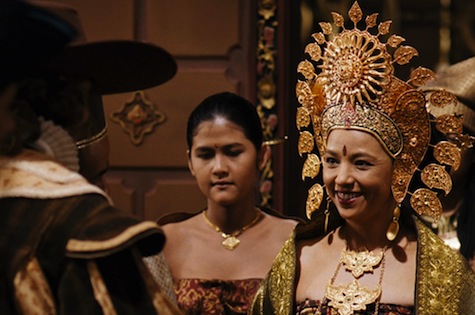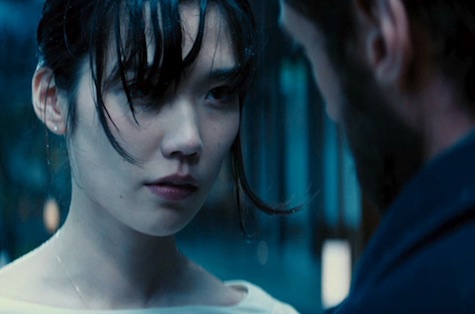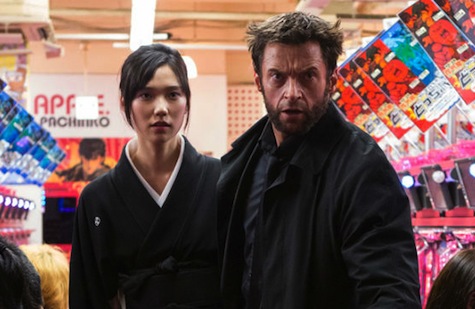What’s with that? Particularly in film and television. You can’t turn around with stumbling over Unfulfilled Sexual Tension, or True Love, or at least a fannish One True Pairing or four. It seems it’s all right to have badass heroic women kicking ass and taking names… as long as they pine for the love of a good man as well. (Nikita, I’m looking at you. Season two: too much boyfriend, not enough roller derby.)
It’s is by no means a universal rule, but the Obligatory Romance is common enough that films and television shows which avoid the obvious romantic angle stand out. This is on my mind right now, because recently I had the privilege of watching two films which didn’t use the set of romance tropes which I’m resigned to encountering almost everywhere. And one film that gave me an Obligatory Romance whose presence I couldn’t understand at all.
 The first of these is Pirates of Langkasuka (Puen yai jon salad/Legend of the Tsunami Warrior), a Thai film from 2008. This film—about magic, queens, pirates, lots of fighting, and giant cannon—does seem to include some nods at a grand romance, but it’s working from a different cultural handbook, and a different narrative one, to the ones I’m used to. It’s also largely an ensemble production: everyone gets their moments of glory. And destruction. This is a film whose triumphant ending sees a princess enthroned, married to the man who can bring her an army rather than the man to whom she said, “I love you.”
The first of these is Pirates of Langkasuka (Puen yai jon salad/Legend of the Tsunami Warrior), a Thai film from 2008. This film—about magic, queens, pirates, lots of fighting, and giant cannon—does seem to include some nods at a grand romance, but it’s working from a different cultural handbook, and a different narrative one, to the ones I’m used to. It’s also largely an ensemble production: everyone gets their moments of glory. And destruction. This is a film whose triumphant ending sees a princess enthroned, married to the man who can bring her an army rather than the man to whom she said, “I love you.”
The second film is Pacific Rim, where the relationship between Mako Mori and Raleigh Becket can be read in romantic terms, but where it is also possible to read that relationship in terms of a sibling-esque friendship. They’re competitive (as we see in the bo training match) and Raleigh is demonstrated to be protective of Mako—albeit stupidly so, as in the case of his fight with Chuck Hansen. In the course of the climactic sequence, Raleigh gets Mako out of the battle alive, which he failed to do for his older brother, and their triumph is not sealed with a kiss—the obvious cheap shot that Hollywood has trained us to expect—but rather a sort of long, drawn-out, visual sigh. The framing suggests, “We’re still alive? Right, then… I need a hug,” as much as anything else. These aren’t people who’ll be immediately jumping into bed with each other, whatever happens.
 Contrast this with the approach to screen relationships taken by The Wolverine. (Although I may be a bit biased: I’ve never loved Wolverine, and this outing was so very much Angsty Brooding White Boy Kicks Ass in Japan with Extra Tortured Angst, it rather put me off entirely.) Excellent as the sibling relationship between the young Japanese women Yukio and Mariko is—a film that passes the Bechdel test, for all its other flaws!—the interlude in which Wolverine has sex with Mariko struck me as unnecessary and rather skeevy. Wolverine is canonically old enough—at least—to be her grandfather, and her grandfather seems to have harboured something of a Wolverine obsession to boot. So here, not only do we have a sexual relationship that comes out of next-to-nowhere, we have one where it’s hard not to see the fact that it is a relationship with a definite power imbalance: they are isolated, and Wolverine is older by far, while at that point acting essentially as Mariko’s bodyguard.
Contrast this with the approach to screen relationships taken by The Wolverine. (Although I may be a bit biased: I’ve never loved Wolverine, and this outing was so very much Angsty Brooding White Boy Kicks Ass in Japan with Extra Tortured Angst, it rather put me off entirely.) Excellent as the sibling relationship between the young Japanese women Yukio and Mariko is—a film that passes the Bechdel test, for all its other flaws!—the interlude in which Wolverine has sex with Mariko struck me as unnecessary and rather skeevy. Wolverine is canonically old enough—at least—to be her grandfather, and her grandfather seems to have harboured something of a Wolverine obsession to boot. So here, not only do we have a sexual relationship that comes out of next-to-nowhere, we have one where it’s hard not to see the fact that it is a relationship with a definite power imbalance: they are isolated, and Wolverine is older by far, while at that point acting essentially as Mariko’s bodyguard.
So, I ask again: what’s with the Obligatory Romance? Is it that sexual attraction is inevitable between unrelated men and women interacting a) closely and/or b) on a long-term basis? (I don’t think so myself.) Is it that we find it hard to believe that relationships can be intimate without being sexual?
I don’t have any answers, but I want to put that out there for discussion. What do you think?
Liz Bourke is a cranky person who reads books. And occasionally watches things. Her blog. Her Twitter.










